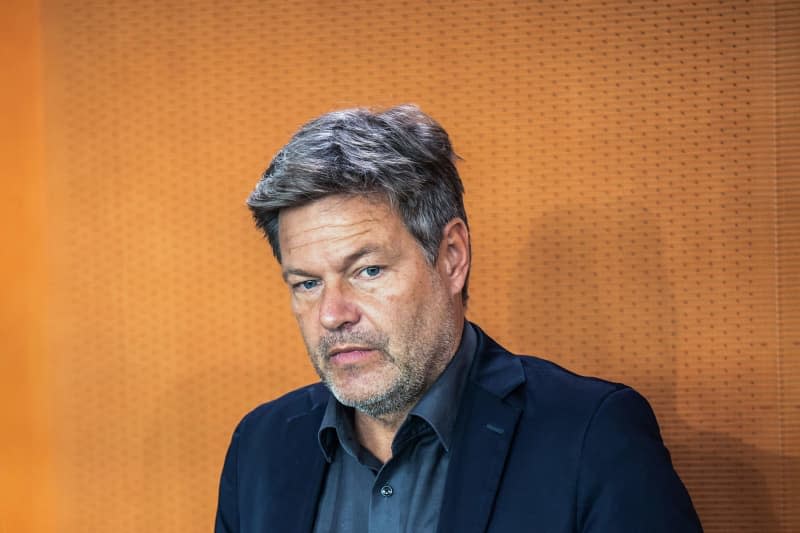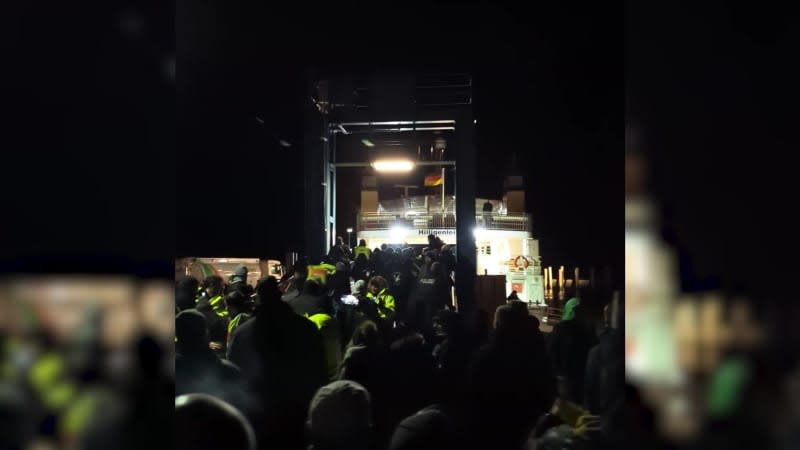German minister says country's mood 'heating up' after ferry blockade

- Oops!Something went wrong.Please try again later.
Germany's Vice Chancellor Robert Habeck expressed concern about the mood in the country following the blockade of the ferry he was on by an angry crowd of farmers.
"What worries me, worries me indeed, is that the mood in the country is heating up so much," he said on Friday.
Habeck, who is also Germany's economy minister, finally made it to the German mainland early Friday, hours after the farmers prevented him from exiting a passenger ferry travelling from the North Sea island of Hallig Hooge.
"Protesting in Germany is a valuable asset," he added. "Coercion and violence destroy this good. We should oppose this in words and deeds."
Up to 300 people took part in the blockade of the pier on Thursday night, and police resorted to using pepper spray, a police spokesman said.
Farmers are outraged by the federal government's planned reduction in agricultural subsidies, including for fuel, although some of the measures have already been rolled back.
Habeck wants to seek dialogue with the farmers, both from the region and at a national level, his spokesman said on Friday. "It is part of his style to talk to people directly."
Germany's Farmers' Association distanced itself from the blockade.
"Personal attacks, insults, threats, coercion or violence are not acceptable," association president Joachim Rukwied said in a statement. "Blockades of this kind are a no-go."
"We are an association that upholds democratic practices," Rukwied added. Despite all the displeasure about the government's tax plans, his association respects the privacy of politicians, he said.
The farmers' association in the northern state of Schleswig-Holstein also distanced itself from the action.
"We realize that we are being infiltrated," said head of the association Klaus-Peter Lucht, adding: "We really don't know who organized this."
The public prosecutor in the German city of Flensburg has opened an investigation on suspicion of coercion following the blockade.
The office is also investigating whether other offences such as resisting law enforcement officers and breach of the peace have been committed, senior public prosecutor Bernd Winterfeldt told dpa on Friday.
An unknown person is currently being investigated, he added.
Habeck, a member of the Green Party who plays a major role in shaping the country's economic and climate policies, has come in for particular criticism from the farmers over the proposed cuts.
The cuts were part of a package of measures intended to plug a multibillion-euro gap in the government budget following a landmark top court ruling at the end of last year that sent the coalition's financial plans into disarray.
On Thursday, the coalition decided to partially scale back its plans, following repeated mass protest from farmers. Fuel subsidies would now be gradually decreased, rather than all at once.
Habeck's exit from the ferry had been blocked as the vessel came in to dock in Schlüttsiel, near the tip of the German mainland near Denmark, on Thursday night.
The minister was not travelling on state business.
"Calls for a demonstration at the Schlüttsiel ferry terminal, where Dr Habeck was due to arrive in the afternoon, were spread on social media," the Flensburg police department reported on Friday.
Some of the protesters tried to storm the ferry, video of the incident showed. No injuries were reported.
The ferry was forced to turn around and go back to Hallig Hooge, a small, low-lying island off northern Germany's west coast with only a handful of residents.
According to the managing director of the ferry's company, the storming of the ship had been narrowly avoided when the captain decided to turn around.
"If this decision had been made a minute later, the ferry would have been stormed," he said on Friday.
Habeck took a later ferry from Hallig Hooge island to the mainland and arrived home at around 2:30 am (0130 GMT). He was not met with protesters upon the ferry's docking, police said.
"Mr Habeck arrived home safely," a police spokesman in the northern city of Flensburg said on Friday morning.
Mainstream parties from across the political spectrum condemned the protest action.


